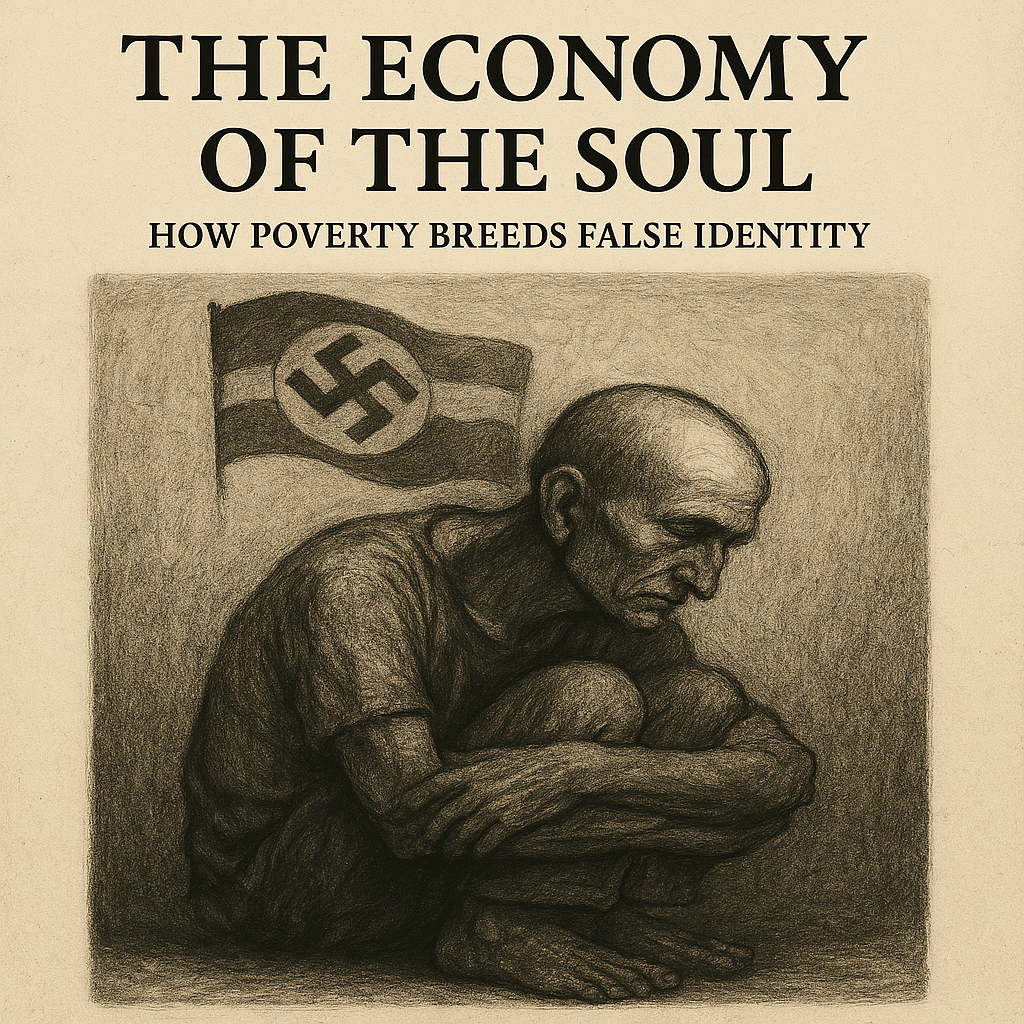
How Poverty Breeds False Identity
In every society, the absence of money is not merely an economic problem—it is an existential one. It deforms aspirations, restricts human growth, and corrodes the moral fabric from within.
Poverty is not just the lack of means; it is the slow erosion of meaning. As the body hungers, so does the soul—for dignity, for purpose, for affirmation. This deprivation triggers a chain reaction: from lack of opportunity to a crisis of self-actualisation, leading to deep psychological vulnerabilities, which are often soothed—not solved—by illusory loyalties: nationalism, tribalism, ideological fanaticism.
Money as a Gateway to Human Potential:
In modern societies, money is not just a medium of exchange—it is a gatekeeper to possibility.
The economic philosopher Karl Marx famously stated:
“The production of too many useful things results in too many useless people”
What he meant was not a disdain for utility but a warning that capitalism, when unbalanced, can commodify human lives. Those without capital—financial or social—are reduced to instruments or forgotten altogether.
Pierre Bourdieu, in his theory of capital, expands this further. He argues that economic capital often converts into cultural and social capital—the tools one needs to navigate and ascend within society.
In other words, poverty is not just about not having money; it’s about not having access to the habits, networks, and resources that unlock doors.
The Death of Self-Actualisation:
Abraham Maslow, in his well-known hierarchy of needs, placed self-actualisation—the realization of one’s full potential—at the top of the human pyramid. But this summit cannot be reached if the base remains unfulfilled. Maslow wrote:
“A man who is being starved for food, safety, love, and respect may fairly be said to be living by bread alone”
Thus, the poor are not merely disadvantaged—they are deprived of the psychological conditions needed to grow, reflect, and create. Their ambitions are narrowed, not by lack of dreams, but by the fatigue of survival.
Simone Weil, the French philosopher and mystic, saw this as spiritual degradation:
“To be rooted is perhaps the most important and least recognized need of the human soul”
She argued that material poverty pulls the individual out of their spiritual roots, making them susceptible to false ideologies that mimic belonging.
Vulnerability and the Manufacture of Loyalty:
When an individual is cut off from the possibility of becoming fully human, a void emerges. And this void does not remain empty—it seeks substitutes.
Erich Fromm, in Escape from Freedom (1941), described how individuals suffering from alienation and insecurity often surrender their autonomy to ideologies, authoritarian leaders, or nationalistic myths:
“If I am nothing but what I possess and what I consume, what am I when I lose what I have?”
In other words, material deprivation can produce psychological dependency. The poor often become fertile ground for manipulation—not because they are weak, but because they are cornered by the need to feel needed.
In such environments, the flag replaces the family, the slogan replaces the soul, and the myth of greatness replaces the dignity of truth. Loyalty becomes less about conviction and more about compensation.
False Identity: The Politics of Poverty:
Modern states and movements have mastered the art of channeling this vulnerability.
Nationalism becomes a balm for bruised egos. Fanaticism becomes a mask for failed selves.
The sociologist Zygmunt Bauman observed:
“The more insecure people feel, the more they crave symbols of security—even if those symbols are empty”
When economic systems fail to provide justice, political systems often offer identity as a distraction. People are taught to hate outsiders rather than question insiders. They are told they belong to a “great nation” even as their water is poisoned and their schools crumble.
Reclaiming Authentic Empowerment:
A truly humane society must understand that empowerment is not a slogan—it is a structure. The goal should not be to pacify the poor with symbols, but to uplift them with substance: education, healthcare, land, dignity.
The Indian philosopher and jurist B.R. Ambedkar, himself born into extreme poverty, warned:
“Political democracy cannot last unless there lies at the base of it social democracy”
Democracy, loyalty, identity—these must be the results of empowerment, not replacements for it. When people are truly fed, educated, and seen, they do not need myths to feel worthy. Their worth is self-evident.
The Song of the Starved:
The soul, like the body, cannot thrive on air. It needs nurture. And when it is deprived, it reaches for anything that promises meaning—no matter how false.
Poverty distorts not just economic life but inner life, and until societies recognize this, they will continue to produce generations who confuse illusion with identity.
“A hungry man is not a free man” — Franklin D. Roosevelt
Let us not merely feed bodies, but free minds—from need, from manipulation, from the tyranny of false belonging. Only then will our politics be honest, our loyalties true, and our nations whole.
Post a comment
You must be logged in to post a comment.




